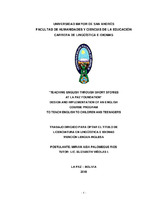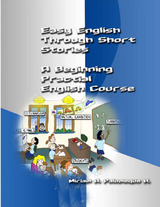Mostrar el registro sencillo del ítem
Teaching english through short stories at La Paz Foundation design and implementation of an english course program to teach english to children and teenagers
| dc.contributor.author | Palomeque Rios, Miriam Aida | |
| dc.contributor.author | Viñolas I., Elizabeth (Tutor) | |
| dc.date.accessioned | 2018-06-28T23:29:07Z | |
| dc.date.available | 2018-06-28T23:29:07Z | |
| dc.date.issued | 2010 | |
| dc.identifier.citation | Lenguas Extranjeras. | es_ES |
| dc.identifier.uri | http://repositorio.umsa.bo/xmlui/handle/123456789/16798 | |
| dc.description.abstract | The current global society increasingly requires from students to have integral education and training in all aspects of life. Technological, scientific, humanistic and linguistic knowledge among other basic requirements are essential for achieving this goal. From a linguistic point of view, it is important to develop all manifestations that enhance communication and demands not only through existing knowledge and through skills needed for one's own language but also through the learning of other languages. The growth of English not only as a language of trade and technology but also as a means of international communication has made from it a compulsory requirement in different fields of knowledge and work areas. Thus, we cannot deny that nowadays English has become one of the primary requirements for the needs of students and people in general. Recent researches on language teaching have evidenced that literature has been widely integrated in language teaching as it provides meaningful and memorable contexts for processing and interpreting new language. Apart from this we can also say that it also transmits cultural knowledge in addition to the fact that it lends itself to linguistic utility. Bearing in mind that the teaching of English in most public and private institutions in Bolivia is generally done at the sentence level and with limited vocabulary and structures, students do not have the opportunity to get involved in literary texts, therefore more opportunities to get the language. Keeping in mind that the way of teaching mentioned before, the use of authentic texts (short stories) in language classrooms will be of great importance, we are highly confident that this will help develop the necessary skills for a better learning. Thus, this project1 shows the interaction between language, literature and language education since short stories provide insights into the life and culture in general. According to Baker (1993), students ought to develop an awareness of not only their own culture, but also other cultures. Multicultural understanding contributes to improved tolerance of one another, aspect that we consider of high importance in our current time in Bolivia. The themes we propose provide stimulating material for exploiting all the four basic macro-language skills: reading, writing, speaking and listening. What we want to do with this project is to teach English language to teenagers at La Paz Foundation, in order to support them in their academic training by providing knowledge of this language that will benefit them to access to literature in the language or to apply to any work where English knowledge is required. To conclude, we want to suggest a change in language teaching in our country. By using the approach of integrating short stories in language teaching, what we want to attain is that the students at La Paz Foundation can be able to learn grammar in context and develop the ability to communicate accurately at a basic level both, appropriately and meaningfully. | es_ES |
| dc.language.iso | en | es_ES |
| dc.publisher | Universidad Mayor de San Andrés. Facultad de Humanidades y Ciencias de la Educación. Carrera de Lingüística e Idiomas. | es_ES |
| dc.subject | INGLES - ENSEÑANZA | es_ES |
| dc.subject | INGLES - APRENDIZAJE | es_ES |
| dc.subject | METODOS DE ENSEÑANZA | es_ES |
| dc.title | Teaching english through short stories at La Paz Foundation design and implementation of an english course program to teach english to children and teenagers | es_ES |
| dc.type | Thesis | es_ES |


